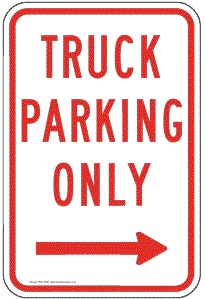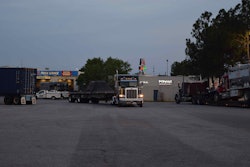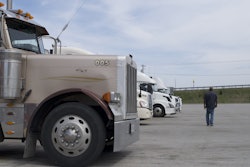
They were, he notes, recently published in formats much more accessible than what was available when Overdrive first reported on the output.
- How to Improve Truck Parking in Your Region (HTML, PDF)
This how-to is available for high-level information for those who are at the point of considering getting involved in parking planning in their region or another they’re an expert in — such as a frequent delivery point. As are the remainder of the resources, it’s available in both html and pdf formats, the former designed for easy online reading, the latter for the ability to print and distribute. - The Importance of Considering Truck Parking in Local Planning and Zoning (HTML, PDF)
“We put together this guide for speaking to officials” of any sort, says Grenerth, particularly elected officials or planning commissioners who may not have the truck parking issue on their radar. This easily-shared “guide is a short, sweet and to-the-point document that lets them know that truck parking is a priority nationwide.” - Parking and Staging Requirements in Local Zoning and Planning (HTML, PDF)
“Nobody’s a really big fan of reinventing the wheel,” so to speak, says Grenerth. This document outlines a variety of examples where zoning was varied to better accommodate freight flows with parking in mind. If you’re attending an MPO or other governmental meeting, you can “walk in with this document that gives examples of zoning and planning,” Grenerth says. “These places have addressed parking — and there are other examples out there, too.” - Including Truck Parking in State and Metropolitan Planning Organization (MPO) Freight Plans (HTML, PDF)
Grenerth describes MPOs as “quasi-governmental, but made up of people like me — I serve on mine in Northwestern Ohio. These people are tasked with looking at the region, not just one geographic line.” MPOs are made up of people who are the most “‘boots on the ground’ when it comes to making things happen. They funnel sate and federal funds to make things happen.” This resource gives examples for MPO reps themselves and drivers of some organizations around the country who have incorporated truck parking into their priorities with good effect.
Also available at the website for the National Coalition are resource materials produced by three other working groups on Parking Capacity, Technology and Data, and Funding, Finance and Regulations. Find them all via this link.
Grenerth notes zoning issues will be central to ongoing work this year in his government-coordination group. He cites examples where misguided zoning makes for big obstacles to increasing truck parking capacity. “In Atlanta, west side of town,” for instance, “the entire western half of a county is zoned to not have truck parking.”
Closer to home for him in Cincinnati, too, a zoning rule requires “any truck parking to be paved — that’s important, because now the cost of any parking project just went up exponentially,” he says. “We want to reach zoning and planning people, so that they keep this in the back of their minds” when writing local rules.

Drivers who get involved, he believes, can sow seeds in planners’ minds that could bear fruit years or even decades from now, if they don’t have an immediate effect. Drivers “are the experts all across the country,” he says, not just on their home regions. When Grenerth was an owner-operator, “In my case, I was also an expert in Nashville,” a frequent destination for him where parking needs were great, though he lived three states away.
Truckers often see clearly the needs not where they live but “where you truck to,” he adds.










